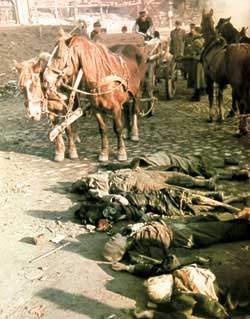| [images
from David Irving, "Apocalypse 1945: the
Destruction of Dresden" added by this
website] 
Saturday, April 9, 2005
No Prosecution of NPD
Chief for "Bombing Holocaust" Scandal
Speech [German] USING
the term "Bombing Holocaust" for the bombing of
Dresden in the Second World War is not a
punishable offence. The Hamburg Public
Prosecutor is not commencing proceedings against
NPD chief Udo Voigt. A spokesman said only the
penal aspect of the matter had been
investigated, not the moral. USING the term "Bombing
Holocaust" for the bombing
of Dresden in the Second
World War is not a punishable offence. The Hamburg
Public Prosecutor is not commencing proceedings
against NPD chief Udo Voigt. Spokesman
Rüdiger Bagger said only the penal
aspect of the matter had been investigated, not the
moral.  David
Irving comments: DEUTSCHE Politiker,
Feiglinge und Lügner. German
politicians are liars and cowards.
 (For making a similar remark about
German historians in 1989 the Nuremberg
public prosecutor intended to charge me --
because of the word "German" -- under
race- hatred laws! Orwell's Napoleon the
Pig lives on.) |
The President of the Central Council of
Jews in Germany, Paul Spiegel, criticized
this decision. He said: "Morally speaking I cannot
understand this." The Public Prosecutor was thus
"opening the door wide to similar utterances."
The controversial phrase was the center point of
an outburst by the right wing extremist NPD in the
Saxon Parliament in January [2005]. NPD
caucus leader Holger Apfel had described the
Allies as "mass murderers" and the February 1945
attacks as "a bombing Holocaust." "Appropriate
choice of words"At this, several Parliament members left the
chamber as a protest. In the following debate on
dealing with the right wing extremists, the Union
party [Conservatives] demanded limits on
the freedom of speech of members. Hitherto members
of Parliament have enjoyed immunity from criminal
responsibility for their remarks in Parliament and
its committees. NPD chief Voigt said one day after the row in
Saxony that Apfel's remarks were an "appropriate
choice of words" and congratulated him on his
stand. As Voigt put it, "the term Holocaust was as
appropriate for the destruction of Jews as it was
for that of the Germans." According to the SPD
[Socialist Party] expert on Interior
affairs in the Federal Parliament, Dieter
Wiefelspütz, the prosecutors' decision is
"correct".  The term "bombing holocaust" was, he said, a
"mendacious, history-falsifying exploitation of the
victims," but the utterance could not be punished.
The term did convey "minimalisation" [a
criminal offence under German law] but only
subliminally. "It may hurt, but it has to be dealt
with by political means." The Union's interior
expert Wolfgang Bosbach expressed himself in
similarly reserved terms. It was not for him to criticize the decision
[not to prosecute.] The phrase was
unacceptable but not necessarily criminal. "Racial
incitement is punishable," said Bosbach. "but not
the utterance of every despicable political
view." Spiegel [the unelected German Jewish
leader] however opined: "It is possible to
prohibit such sayings, if you just apply the laws
consistently." It seemed very questionable to him,
whether statements which are obviously incitements
to race hatred belong in the category of freedom of
opinion."
 Saturday, April 9, 2005
Skandal-Rede Kein Verfahren
gegen NPD-Chef wegen "Bomben-Holocaust" DER
Begriff "Bomben-Holocaust" für die
alliierte Bombardierung Dresdens im Zweiten
Weltkrieg ist nicht strafbar. Die
Staatsanwaltschaft Hamburg leitet kein
förmliches Verfahren gegen den
NPD-Bundesvorsitzenden Udo Voigt ein. Ein
Sprecher sagte, es sei der strafrechtliche
Aspekt geprüft worden - nicht der
moralische. Der Begriff
"Bomben-Holocaust" für die alliierte
Bombardierung Dresdens im Zweiten Weltkrieg ist
nicht strafbar. Die Staatsanwaltschaft Hamburg
leitet kein förmliches Verfahren gegen den
NPD-Bundesvorsitzenden Udo Voigt ein, sagte
Behördensprecher Rüdiger Bagger. Es sei
der strafrechtliche Aspekt geprüft worden -
nicht der moralische. Der Präsident des
Zentralrats der Juden in Deutschland, Paul Spiegel,
kritisierte diese Entscheidung. Er sagte:
„Moralisch habe ich dafür kein
Verständnis." So öffneten die
Staatsanwälte „Tür und Tor für
ähnliche Äußerungen". Der umstrittene Begriff
stand im Mittelpunkt eines Eklats der
rechtsextremen NPD im Sächsischen Landtag im
Januar. NPD- Fraktionschef Holger Apfel
hatte die Alliierten als „Massenmörder"
bezeichnet und die Angriffe im Februar 1945 einen
„Bomben-Holocaust" genannt. "Zutreffende
Wortwahl"Daraufhin verließen
etliche Parlamentarier unter Protest den Saal. In
der anschließenden Debatte über den
Umgang mit den Rechtsextremen wurde aus den Reihen
der Union gefordert, die Redefreiheit von
Abgeordneten einzuschränken. Abgeordnete sind
bislang frei von strafrechtlicher Verantwortung
für ihre Äußerungen in Parlamenten
und Ausschüssen.  NPD-Chef
Voigt hatte einen Tag nach dem Eklat in Sachsen
Apfels Äußerungen als „zutreffende
Wortwahl" bezeichnet und ihm zu seinem Auftritt
gratuliert. Der Begriff Holocaust treffe laut Voigt
„sicherlich auf die Vernichtung der Juden wie
auch der Deutschen zu". Nach Auffassung des
SPD-Innenexperten im Bundestag, Dieter
Wiefelspütz, ist die Entscheidung der
Strafverfolger „korrekt". NPD-Chef
Voigt hatte einen Tag nach dem Eklat in Sachsen
Apfels Äußerungen als „zutreffende
Wortwahl" bezeichnet und ihm zu seinem Auftritt
gratuliert. Der Begriff Holocaust treffe laut Voigt
„sicherlich auf die Vernichtung der Juden wie
auch der Deutschen zu". Nach Auffassung des
SPD-Innenexperten im Bundestag, Dieter
Wiefelspütz, ist die Entscheidung der
Strafverfolger „korrekt".
Der Begriff
„Bomben-Holocaust" sei eine „verlogene,
geschichtsfälschende Ausbeutung der Opfer".
Dennoch könne die Äußerung nicht
bestraft werden. Der Begriff transportiere die
Verharmlosung nur unterschwellig. „Das tut
weh, muss aber politisch bekämpft werden."
Zurückhaltend äußerte sich auch
Unions-Innenexperte Wolfgang Bosbach. Er habe die Entscheidung
nicht zu kritisieren. Der Begriff sei nicht
akzeptabel, aber nicht unbedingt strafbar.
„Volksverhetzung ist strafbar", sagte Bosbach,
„aber nicht jede verwerfliche politische
Meinungsäußerung ist es." Spiegel meinte dagegen:
„Solche Äußerungen kann man
verbieten, wenn man die Gesetze nur konsequent
anwendet." Für ihn sei es „sehr fraglich,
ob Äußerungen, die klar volksverhetzend
sind, zur Meinungsfreiheit
gehören".
|